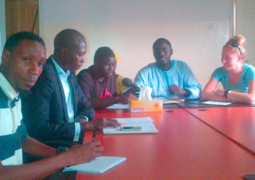The Central Bank of The Gambia, in collaboration with IMF-AFRITAC West II, yesterday convened a workshop on IFRS for staff of various banks and stakeholders within the banking system.
The forum, organized by the IMF-AFRITAC West 11, was held at the Ocean Bay Hotel in Bakau.
In her opening speech, Oumie Samba-Savage, the second deputy Governor of the Central Bank of The Gambia, said the training marked the commencement of an important workshop on enhancing IFRS accounting in The Gambia.
She disclosed that this is first phase of a two-part workshop, with the second phase due to take place in September this year.
The training workshop aimed at assessing the continued progress of the sector in implementing IFRS accounting standards, and identifying key gaps and challenges that continue to exist, she said.
It was also to assist the authorities in enhancing knowledge and understanding of standards, determine the key priorities for ensuring full compliance and consolidate the achievements so far in The Gambia since the adoption of IFRS, she added.
Mrs Samba-Savage also stated that the Gambian authorities have subjected the country to report on standards and codes of ROSC auditing and accounting review to assess the strength and weakness of auditing and accounting in The Gambia.
The report, therefore, revealed, among others, the shortcomings of the existing statutory framework, which comprised various legislations, with inadequate and generally outdated methods, and did not provide a clear direction on the applicable standards for financial reporting and auditing.
A national qualification programme, among others, did not also guide professional education and training, she said, adding that apart from ensuring compliance with prudential regulations issued by the Central Bank of The Gambia, there were no mechanisms for ensuring compliance with accounting and auditing standards.
The report also recommended the development of a country action for implementation under the auspices of the Ministry of Finance and Economic Affairs, according to Mrs Samba-Savage, who also stated that the report further recognised the need for collaboration with stakeholders and support from development partners.
“The main objective is to strength the accountancy profession, build a strong financial reporting infrastructure, and enhance corporate financial reporting in The Gambia,” she added.
Pursuant to this objective, she went on, the Central Bank of The Gambia issued a directive on the adoption of IFRS by all commercial banks with effect from December 2013.
In the lead to adoption, a series of workshops were organised by the World Bank for financial institutions and staff of the Central Bank of The Gambia, “although a number of gaps still remains”, she stated.
Mrs Samba-Savage further disclosed that the two-week workshop was designed to address outstanding issues, which have been identified and or which may come up during the deliberations.
She thanked the IMF for their continued technical assistance towards the development of the financial sector in The Gambia.
The Central Bank of The Gambia benefited in the past from technical assistance by the IMF in areas such as stress testing-off-site and on site-report writing techniques, computation of FSIs and then the two-part workshop on IFRS, she said.
The second deputy governor assured the IMF that the technical assistance received thus far, “has had a positive impact” on the mandate of the Central Bank.


